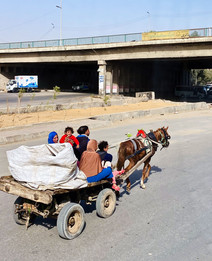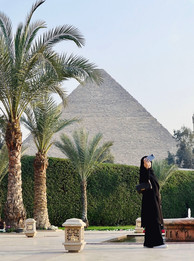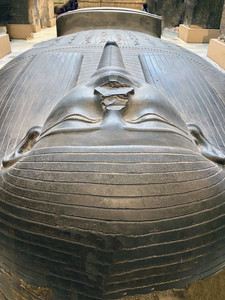Travel Guide - Egypt
- whereintheworldsar
- Sep 24, 2025
- 5 min read

My experience of Egypt ...
Travelling in March and April, the majority of my travel through Egypt was as part of a group who were on a spiritual quest, under the guidance of Lee Carroll (Kryon), so we were given access to many temples and pyramids before the crowds arrived, and as private visitations. We did a lot of meditating onsite and it was a very moving experience. I felt extremely safe the whole time we were there as we had armed officers as part of our protection group. Everything was extremely well organised and I was able to fully appreciate the historical Egypt, as well as the busy and chaotic modern day Egypt, with its overcrowding, rubbish and unique atmosphere. The experience of climbing down into the heart of these great pyramid structures, exploring temples and hieroglyphics, and the opportunity to explore many of the amazing sites of worship, whilst cruising one of the world's mightiest rivers, the Nile, was truly rewarding and unforgettable.
I also made my own way up to Alexandria, on the Mediterranean Sea, and spent a few days there exploring by myself, having no problems at all. From Egypt I went on to do some Intrepid Travel tours through Jordan, Israel and Palestine and then a MSC Cruise of the Mediterranean, from Haifa, Israel. The whole experience of this region was a very rewarding one and to visit the places that have forged much of our human history and religious stories was remarkable, and I highly recommended it to all travellers.
Overview of Egypt
Egypt, located in northeastern Africa, is a country rich in history and culture. Approximately 1,001,450 sqkm (386,650 sqm), it is famous for its ancient civilisation, which dates back thousands of years. The Nile River, one of the longest rivers in the world, flows through Egypt and has been vital for agriculture and life in the region.
Travel Tips:
Visa Requirements: Egypt has specific visa requirements that vary depending on the nationality of the traveller, the purpose of the visit, and the duration of stay so check against your passport type for what is required for your visit.
Best Time to Visit: October to April for mild weather.
Dress Code: Modest clothing is recommended, especially when visiting religious sites.
Local Currency: Egyptian Pound (1USD = 48.19EGP).
Transportation: Use taxis or arrange guided tours for easier navigation. Should you wish to brave the chaos of the roads, you will be driving on the right-hand side ... my advice here is to take a tour!
Health Precautions: Ensure you are up-to-date on routine vaccines, and consider vaccines for hepatitis A and B, typhoid, and rabies. Drink bottled water and well-cooked food.
Language: Arabic is the predominant language spoken.
Safety Tips
Stay aware of your surroundings and avoid isolated areas.
Keep your belongings secure and be cautious with valuables.
Follow local customs and respect cultural norms.
Cuisine to Try
Koshari: A popular Egyptian dish made of rice, lentils, and pasta.
Fatta: A traditional dish with rice, meat, and garlic vinegar sauce.
Baklava: A sweet pastry made of layers of filo dough, nuts, and honey.
Historical Significance
Egypt is home to iconic landmarks such as the Pyramids of Giza, the Sphinx, and the temples of Luxor and Karnak. These structures are testaments to the advanced engineering and architectural skills of the ancient Egyptians. The country also has a fascinating history involving pharaohs, hieroglyphics, and significant contributions to mathematics and medicine.
Modern Egypt
Today, Egypt is a vibrant nation with a mix of ancient traditions and modern influences. Its capital, Cairo, is one of the largest cities in Africa and offers a bustling atmosphere with markets, museums, and a rich culinary scene. Tourism plays a crucial role in Egypt's economy, attracting millions of visitors each year who come to explore its historical treasures and enjoy its beautiful landscapes, including the Red Sea resorts.
Culture and People
Egyptian culture is a blend of ancient and contemporary influences. Just under 119 million people live here and are known for their hospitality and warmth. Traditional music, dance, and festivals are integral to Egyptian life, showcasing the country's diverse heritage.
Egyptian art is a rich and diverse field that spans thousands of years, characterised by its unique style and symbolism. It primarily served religious and ceremonial purposes, reflecting the beliefs and values of ancient Egyptian society.
Top Destinations...
Cairo: Home to the iconic Pyramids of Giza and the Sphinx, as well as the Egyptian Museum.
Luxor: Known for the Valley of the Kings, Karnak Temple, and ancient tombs.
Aswan: A beautiful city on the Nile, famous for the Abu Simbel temples.
Sharm El Sheikh: A resort town known for its stunning beaches and diving spots.
Alexandria: A city steeped in history and culture, located on the Mediterranean coast of Egypt, and founded by Alexander the Great in 331 BC; it has been a hub for knowledge, trade, and diversity for centuries.
My Top 5 Tourist Highlights of Egypt
1. The Great Pyramids of Giza
The iconic Great Pyramids continue to be a must-visit, offering a glimpse into ancient Egyptian civilization. The newly enhanced visitor experience includes guided tours and augmented reality features. You can't climb up them anymore, but climbing inside them truly is an exciting and rewarding adventure.
2. Luxor's Karnak Temple
Karnak Temple, one of the largest religious complexes in the world, showcases stunning hieroglyphs and massive columns. In 2025, visitors can enjoy immersive sound and light shows that bring history to life.
3. The Nile River Cruises
Experience the beauty of the Nile with luxurious cruises that offer breathtaking views and onboard entertainment. New eco-friendly options are available, emphasizing sustainability. Consider that you have options to cruise the upper and lower Nile; and gain an idea of the significance that the Aswan High Dam had on the river, the land adjoining the river and the people who populate the area.
4. The Egyptian Museum and The Grand Egyptian Museum, Cairo
Home to an extensive collection of ancient artifacts, the revamped Egyptian Museum features state-of-the-art displays and interactive exhibits, making it a highlight for history enthusiasts. The newly opened Grand Egyptian Museum, situated just outside of Cairo, on the Giza Plateau (next to the pyramids), covers an area of 500,000 sqm and is the world's largest archaeological complex dedicated to a single civilisation.
5. Abu Simbel Temples
The magnificent temples of Abu Simbel are a marvel of engineering and artistry. In 2025, enhanced accessibility and guided tours make this UNESCO World Heritage site more inviting than ever. The relocation of the temples (1964-1968) was an engineering feat to save them from the rising waters of the Aswan High Dam's reservoir, Lake Nasser.
In summary, Egypt is a land of wonders, where ancient history meets a bustling, modern life, making it a unique and fascinating destination... and when in the area, consider extending your trip to Jordan and Israel; there are many options available that will give you a safe and carefree journey, while helping to boost these places with your presence and tourism dollars.






























































Comments